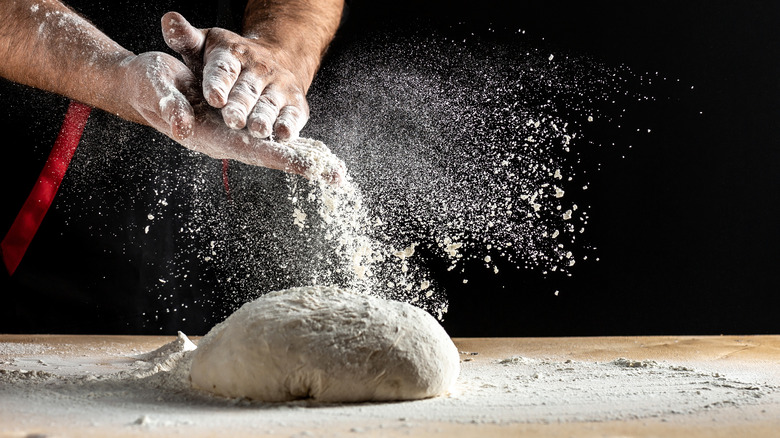The Real Reason You Should Avoid Raw Flour Products At Restaurants
A 2021 story from Eat This, Not That! highlights risky foods when eating out. Many foods on this list might surprise you, including the recommendation to avoid letting kids play with raw pizza dough provided at restaurants. However, there is a good reason to only eat pizza dough, and any flour-containing dish, fully cooked.
The Centers for Disease Control and Prevention (CDC) has a page called "Say No to Raw Dough". Many people are familiar with the risks associated with eating raw dough containing egg products, such as Salmonella infection which can cause gastrointestinal (GI) upset. However, the CDC explains raw dough (such as pizza dough) and uncooked cake mixes containing flour may be contaminated with a bacteria called Escherichia coli, or E. coli. The CDC investigated E. coli outbreaks associated with flour or flour-containing products in 2016, 2019, and 2021.
E. coli is a bacteria that lives in the intestines of animals, such as cattle, and can be spread by consuming raw or undercooked meat products. Infection can also occur after drinking or swimming in water contaminated with E. coli and from personal contact with infected individuals. Person-to-person transmission is particularly common in places like daycares or nursing homes, per Cleveland Clinic.
Beyond these more common causes of infection, E. coli contamination is showing up in other food items. According to the CDC, past E. coli related outbreaks have stemmed from flour, baking mixes, and packaged salads.
How to stay safe
According to Johns Hopkins Medicine, symptoms may develop within five days of exposure to E. coli, and primarily involve the GI system. Abdominal cramps, bloody and non-bloody diarrhea, and nausea are common. In addition, individuals may or may not have a fever and may feel fatigued. Symptoms can last for up to eight days.
A serious complication of E. coli infection is hemolytic uremic syndrome (HUS). HUS can lead to kidney failure and death. Of those infected with E. coli, approximately 8% will develop HUS. Children and those who are elderly are more at risk of developing HUS. Care for HUS may involve treatment in an intensive care unit (ICU). Even with treatment in this specialized unit, 3-5% of individuals who develop HUS may die.
Pizza and other flour-containing foods are tasty treats. However, to consume these foods safely, the CDC recommends a few simple steps to prevent E. coli and keep everyone safe. These steps include keeping raw flour separate from other ingredients, thoroughly cleaning up areas with raw flour, and only eating flour if it is properly cooked. Eating at restaurants, including pizza restaurants, can be fun and safe when proper steps are taken to avoid customers consuming or handling raw flour.


